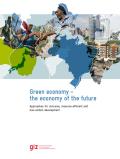The green growth concept has both strategic and analytical merit. It has strategic merit by turning a negative debate about a costly constraint (on emissions) into a narrative about potentially attractive opportunities. Authors like Barrett believe that this might change the dynamics of the international negotiations.
Analytically, green growth applies a new, richer and more diverse set of economic tools to a burning issue. This has implications on policy design. The ‘green growth’ narrative reinforces, rather than diminishes, the need for collective action. The economic opportunities that green growth may bring do depend on a joint understanding by a sufficiently large number of players that this is the way to go. This makes green growth a classic collective action problem.

Green economy and green growth can best be pursued by using a multi-disciplinary approach, mobilising know-how and best practices from various fields. To this end, GIZ has established an Exchange Platform on Green Economy and Green Growth. It facilitates learning about the green economy, further develops services for our partners and commissioning parties and promotes good practices across our programmes.
The platform draws on the long-standing expertise of GIZ’s Sectoral Department, which offers services and concepts that contribute to the development of a green economy, in particular in the areas of:
- Economic development and employment
- Good governance and human rights
- Water, energy and transport
- Rural development and agriculture
- Environment and climate change
Are poverty alleviation and environmental sustainability conflicting objectives? Or do the two goals support each other? Both are traditional domains of policy-makers aiming to promote green growth and pro-poor or inclusive growth. But in recent years, market based approaches that harness the capabilities of private-sector players have gained credibility and attracted increasing attention. In the process, traditional roles have been blurred. Today, solutions to tackle poverty alleviation and environmental sustainability are being implemented by a wide array of actors.
Strategies to alleviate poverty and achieve environmental sustainability are often highly interlinked and definitions by both policy and business actors of one strategy will often cross-reference the other. UNESCAP’s definition of green growth, for example, refers to ‘socially inclusive development,’ while the Millennium Development Goals include ‘Ensure Environmental Sustainability’ as one of their eight goals. On the business level, definitions of inclusive business strategies state that their objective is to include the poor as ‘participants in low-carbon and climate-resilient growth.’
A green economy in the context of sustainable development and poverty eradication (hereafter green economy) requires major structural and technological changes in key sectors such as infrastructure, industry, agriculture and transportation. Near-term investments in all these sectors must be financed for long-term sustainable development. This Issues Brief provides a picture of current and required financial flows for the transition with a focus on identifying major gaps in finance. The Brief outlines proposals for finance including those from the Rio + 20 Compilation text and where possible attempts to convey their feasibility and potential. It suggests that the transition will require the identification of new sources, the streamlining of existing channels and the effective design and utilisation of instruments to leverage private investment.
Green Jobs have become an emblem of a more sustainable economy and society that preserves the environment for present and future generations and is more equitable and inclusive of all people and all countries. Construction has been recognized as a significant contributor to climate change through its emission of global warming gases (GWG). Construction of new buildings and refurbishment of existing buildings alike also represent the largest potential for technically feasible and economically viable reductions of emissions and of energy consumption, while encouraging the development of new professional skills and generation of significant employment opportunities.
South Africa was the first country studied by the ILO in specific regard to Green Jobs in Construction and the present document is an edited version of the research report.
